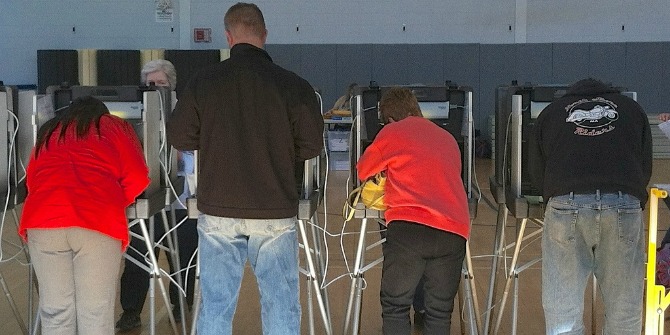 Over the weekend, former President Donald Trump hosted his first major campaign event at a rally in Ohio since securing the Republican nomination. He told cheering supporters that there would be a “bloodbath” if he lost the 2024 election, which his defenders insist was in reference to remarks about the US auto industry. In this Q&A, Thomas Gift discusses the comments and analyses and how Trump and President Joe Biden are positioning themselves for the general election.
Over the weekend, former President Donald Trump hosted his first major campaign event at a rally in Ohio since securing the Republican nomination. He told cheering supporters that there would be a “bloodbath” if he lost the 2024 election, which his defenders insist was in reference to remarks about the US auto industry. In this Q&A, Thomas Gift discusses the comments and analyses and how Trump and President Joe Biden are positioning themselves for the general election.
What did you make of Donald Trump’s “bloodbath” remarks that went viral on Saturday from a rally in Vandalia, Ohio?
Taken in context, I’ll grant that the term “bloodbath” was mostly in reference to the American auto industry. That’s giving Trump the benefit of the doubt because his speeches are always a bit disjointed, and he often mashes phrases together. But even so, that doesn’t mean his words weren’t a problem. Trump consistently traffics in this kind of catastrophizing language. It’s violent, apocalyptic rhetoric designed to trigger a visceral reaction. There are ways to speak about problems that aren’t so incendiary. But Trump wants to whip up anger. It’s part of his demagoguery. Plus, if we’re putting Trump’s remarks in context, it’s worth pointing out that in the same speech he praised January 6th rioters as “unbelievable patriots.” He also said that America might not have any more “meaningful” elections if he didn’t win in 2024. The message was dark. It’s also a harbinger of what we can expect from Trump in the general election campaign.
So now that Trump’s secured the GOP nomination, do you expect him to try to reach across the aisle?
Trumpism is about the politics of fear. It’s about the politics of grievance. It’s about the politics of retribution. I think anyone expecting Trump to change course now is missing the mark. Doing so wouldn’t track with his record. In 2016 and 2020, Trump dialed up the heat heading into the general election. He tacked to the right on almost every issue, from taxes to crime to energy to the culture wars. He never tried to widen his circle of support, and he has never apologized. Trump isn’t about persuasion. He’s about base mobilization and maximizing outrage. There are isolated issues, like abortion, where Trump could move to the center. But there are others, like immigration, where Trump could shift even further to the right. Ironically, the fact that Trump is so alienating to a large fraction of Americans could be freeing for his campaign. He can write off that slice of the electorate, and double down on galvanizing his core supporters.
Is there any way that Trump will moderate on policy?
Trump moderating for the general election will be more about what he doesn’t say than what he does. It’ll be about downplaying the importance and relevance of select issues. That’s especially true of abortion. Trump knows that the Dobbs decision, which overturned Roe v. Wade, poses electoral pitfalls for Republicans. We saw that in the 2022 midterms. We saw that in state referendums across the country, which mobilized Democrats. Trump’s especially vulnerable on this issue because Democrats can draw a straight line between his Supreme Court picks — Neil Gorsuch, Brett Kavanaugh, and Amy Coney Barrett — and the erosion of reproductive rights. Trump does have to walk a tightrope because he relies on Evangelical and social conservative support. But these groups already know Trump got them their win. So, I imagine Trump will avoid talking about abortion as much as possible. To the extent that he’s forced to, he’s likely to support something like a compromise, 16-week ban, with exceptions.

“Former President Donald Trump Holds Camp” (CC BY-SA 2.0) by liam.enea
What will Joe Biden’s primary campaign message be heading into the general election?
Biden’s ideal scenario seems to be for American voters to be thinking about January 6th as much as possible heading to the ballot box. We saw it in Biden’s State of the Union address. He’s depicting 2024 as a world-epic battle between democracy and authoritarianism. At stake is everything from the preservation of elections to respect for the rule of law. At the same time, Biden’s trying to tie domestic challenges to democracy to a larger fight against autocracy in foreign policy. This is where he’s pegged GOP opposition to funding for Ukraine as threatening the liberal, rules-based order. I think the problem with this narrative is that a lot of Americans don’t believe that US democracy faces an existential threat. Some think it’s wrong to equate policy differences over funding for foreign wars to whether one’s pro-democracy. And some feel that the abstract democracy discussion is divorced from kitchen-table issues like the economy.
What’s Biden’s biggest Achilles heel right now?
Biden’s still seeking that elusive message on the economy. What he wants to do is highlight his administration’s recent achievements. The S&P 500 continues to hit record highs. Unemployment is below four percent. Inflation did come in a bit hot last month, with the CPI increasing by .4 percent on a monthly basis in February. But still, year-over-year inflation is down considerably. The problem is that there’s a disconnect in the polls, where Americans are pessimistic about the state of the US economy. Some want Biden to take more of an “I feel your pain” approach. But a lot of strategists think that’s conceding too much. So right now, Biden is striking more of a balance by describing the economy as being in “comeback mode.” Whether that proves convincing is to be determined. Bidenomics became synonymous with cost of living spikes post-pandemic. The administration hasn’t been able to shake that reputation, ever since Biden and Treasury Secretary Janet Yellen promised inflation would be transitory.
- These remarks are based in part on an interview by Thomas Gift for CNN “Newsroom” on March 18, 2024.
- Please read our comments policy before commenting.
- Note: This article gives the views of the author, and not the position of USAPP – American Politics and Policy, nor the London School of Economics.
- Shortened URL for this post: https://wp.me/p3I2YF-dHb






